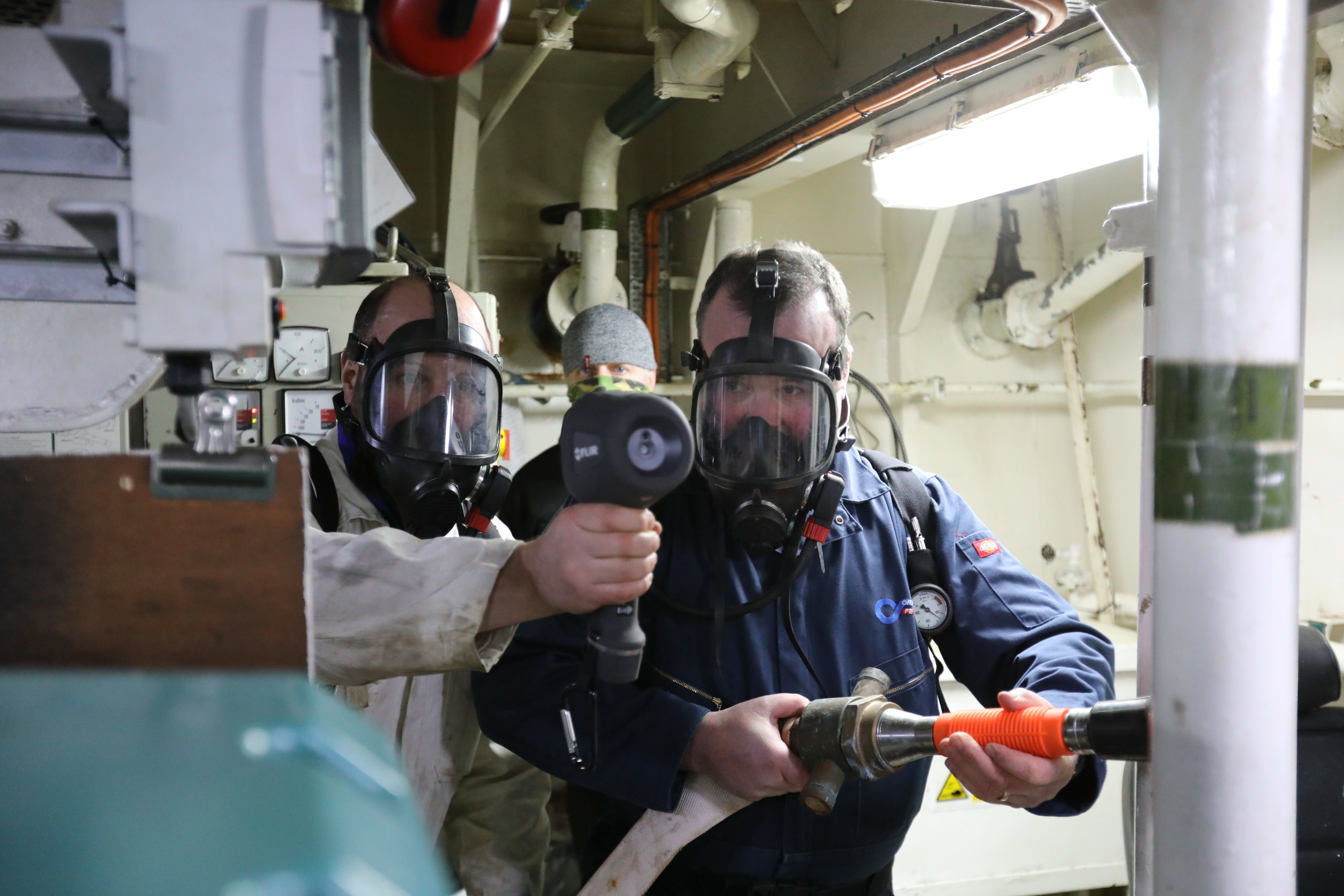Orkney Leading the Way with Hydrogen Seafarer Training
The very first cohort of seafarers to be trained to work on hydrogen powered vessels have been put through their paces on a new course in Orkney.
Five crew members from Orkney Ferries’ MV Shapinsay completed the course, equipping them with the necessary skills to work onboard the ferry when hydrogen, a zero-emission fuel, is used in the vessel’s system.
This follows on from an earlier course completed by the crew which focused solely on the handling of hydrogen as a cargo.
The new course, believed to be the first of its kind in the world, was developed and delivered in Orkney by Orkney College UHI's Maritime Studies department in collaboration with Orkney Ferries and the European Marine Energy Centre.
Delivery of the course was supervised virtually by Maritime and Coastguard Agency (MCA) assessors who have now recommended the course and content for official recognition.
The world-leading course is the latest milestone in the HyDIME project – an Innovate UK funded project that will integrate hydrogen storage onboard the ferry operating between Shapinsay and Kirkwall, and trial hydrogen as a fuel in one of the vessel’s auxiliary engines.
The four-day course covered a range of theoretical and practical aspects relating to the use of hydrogen fuel on board vessels. This included storage under pressure, safe working practice around hydrogen gas, refuelling (also known as a bunkering), firefighting as well as operational and safety management procedures specific to the hydrogen equipment installed on the MV Shapinsay.
The last day, dedicated to practical training, saw the cohort take part in several practice drills for hydrogen bunkering and fire safety. Each crew member completed a hydrogen bunkering simulation using the training rig facility owned and operated by EMEC at the Kirkwall Pier Fuel Cell with additional support from Northwards, a local haulage company experienced in hydrogen transportation.
Crew members were also trained in how to detect hydrogen fires which are almost invisible to the naked eye by using thermal imaging, as well as the very specific ways in which fires are fought when hydrogen is present.
The new training will be a requirement in UK waters for working on vessels using hydrogen as a fuel and is an addition to existing international requirements under the IGF code (International Code of Safety for Ships using Gases or other Low-flashpoint Fuels).
Commenting on the new course, Mark Shiner from the Maritime Studies Department of Orkney College UHI, said: “This has been a great piece of local teamwork between the Maritime Studies department, Orkney Ferries and EMEC.
“According to the Zero Emissions Ship Technology Association this is a world first and we have cause to be very proud of that indeed.
“We’ve received some very encouraging messages from hydrogen organisations at home and abroad and enquiries from other European hydrogen vessel projects who are considering using our training.
“There is huge potential in hydrogen training, not only for seafarers but maintenance technicians, heating engineers, automotive engineers and others. I am looking forward to Orkney College UHI taking this agenda forward, building on what we have done so far.”
Working with a wide variety of partners from the rest of Scotland, UK and Europe, Orkney is playing a pivotal role in the development of green hydrogen technologies through a variety of projects including HyDIME, Surf N Turf and BigHIT, which will help in meeting carbon reduction targets and supporting the further development of renewable energy technologies.
Councillor Graham Sinclair is Chair of Orkney Islands Council’s Development and Infrastructure Committee. He said: “Orkney has a proud history of leading the charge to find innovative solutions to meet our energy needs – and here we see Orkney leading the way again with the approval of the hydrogen training course.
“While it is impossible to look into the future with any certainty, Orkney will continue to influence the low carbon energy landscape of tomorrow by demonstrating that it is possible to deliver positive outcomes with technology that exists today.
“Key to Orkney’s success in the energy industry is the ability for the public and private sectors to bring knowledge and experience together locally to reach a shared goal - and this project is a great example of that. I congratulate all involved.”
HyDIME is focused on the use of hydrogen as a fuel in marine transport. The project will also gain the necessary marine licences and regulatory approvals for hydrogen to be used as a fuel in a marine environment which will have a significant impact on future hydrogen marine projects across the rest of the UK.
Hydrogen can be produced by electrolysis of water (H2O) by using an electric current to split water into its component parts of Hydrogen (H2) and Oxygen (O2). Production of ‘green’ hydrogen uses renewable energy to power to the electrolysis of water.
It is currently used for various applications such as chemical production, fertilisers for agriculture, rocket fuel and food production.
One of HyDIME’s goals is the design and physical integration of a hydrogen injection system on a commercial passenger and vehicle ferry which will be the first of its kind worldwide.
The hydrogen used in the HyDIME project will be cleanly produced from renewable energy. Excess energy generated from Orkney’s abundance of wind and tidal power will be used to produce hydrogen via electrolysis, resulting in carbon free, ’green’ hydrogen.
Looking to the future beyond the project, HyDIME will conduct a scale-up analysis, addressing key questions such as, “How much hydrogen and renewable energy would be required to fuel the Shapinsay ferry PLUS a fleet of hydrogen vehicles in Orkney?” and “Can this project be replicated in other areas of Scotland and the rest of the UK?”.
The HyDIME project will provide a stepping stone to accelerate and de-risk future hydrogen marine projects and will contribute towards growing the hydrogen economy in the UK.
More details - https://hydime.co.uk/
